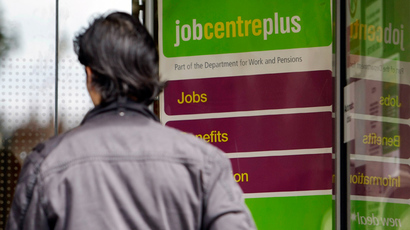'Going once, going twice, sold’: UK seeks to auction visas to wealthy bidders

Immigrating to the UK could soon depend simply on how thick your wallet is, as the country considers auctioning off tier-one visas to the wealthiest bidder. The measure has come under fire from critics fearing an ‘eBay culture’ of immigration.
The move, which will be voted on Tuesday by the home secretary’s Migration Advisory Committee (Mac) is seen as a direct response to hordes of businessmen with families from places such as Russia, China and the Middle East, who have a very easy time applying to live in the UK indefinitely, while contributing little to its economy, The Guardian says.
Under the proposed new law, the wealthy would be invited to bid for tier-one or investor visas, which allow indefinite stays in the country. Another measure is also being proposed, with a little more focus on development; it would be centered on charitable donations to hospitals or educational institutions.
Some immigration lawyers, however, don’t see things that way, and worry that the measure is creating an ‘eBay culture' of bidding that offends the British sense of morality and fair play.
The system currently in place isn’t vastly different at the surface: the basic components – involving rich businessmen accelerating their visa procedures based on amount invested – are still there. Currently, “investor” visa applicants pay anywhere between £1m and £10m to speed up the process of permanently settling in the UK. Those at the upper extreme can acquire residency in just two years (others get anywhere from that to five).
However, they often find the investors often employ tactics that bring the money right back to them.
The 600 or so annual applicants were often found to have foreign investments in offshore accounts that were unusable as investments in the UK. At times, these investments would even take on the form of loans to the very business the applicant owns. They also buy government gilts, and then subsequently sell them. On top of that, the applicants aren’t mandated to have a job or to even speak English, the UK’s Home Office discovered in December 2012.
In a bid to combat this rising trend, the new system is being proposed, and it has its advocates, including the chairman of the Migration Advisory Committee, Sir David Metcalf. He sees little alternative for making investor visas beneficial to the UK than for it to start “auctioning some of those slots… There should be a proper discussion about it. Equally it may well be that we should be letting people in if they endow a Cambridge college, a major teaching hospital or the London School of Economics with £10 million," he told the House of Commons Home Affairs Select Committee.
The lawyers on the other side of the fence do not fret over the
Tuesday vote much, since they view the Mac report as a mere
collection of recommendations and analyses of the economic impact
of the current tier-one visa seekers. Therefore, the UK
government will be taking more factors into consideration with
regard to alleviating those issues.
“The migration advisory committee has suggested auctions
before for visas on the basis that they think if there’s demand
and a market for this, then the highest bidder will pay,”
Nick Rollason, head of business immigration at Napley Law Firm,
told RT.
“The problem I think with the auction is that while it will attract those very, very high net worth individuals where money is no object and they can just throw as much as they want at it…the thing about those schemes is that they need to have very clear rules. And by that, we need a clear investment level,” he added. “When you start saying it could be anything from two million upwards, it could be 30 million …I think people don’t like that uncertainty,” he said.














